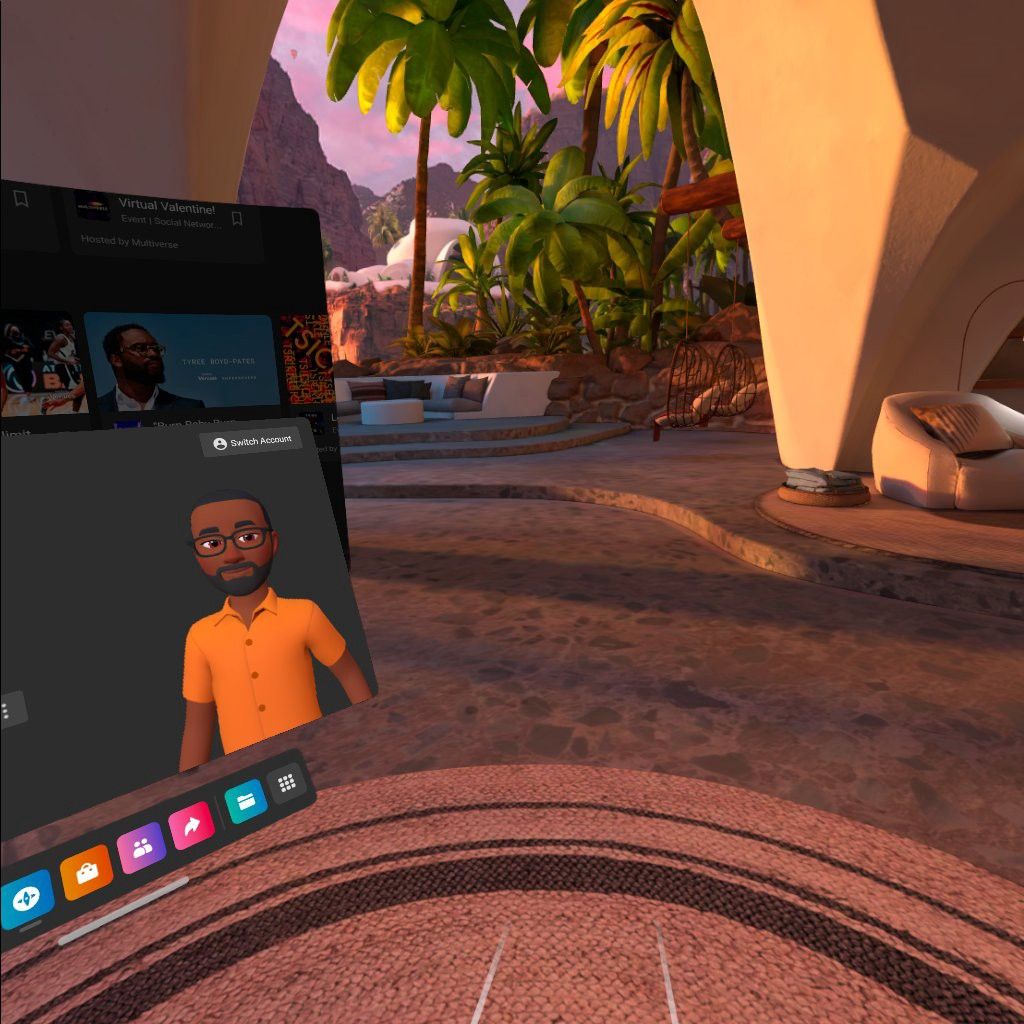I Tried The Metaverse, and It’s None Of Facebook’s Business

I’ve been using ‘ the Metaverse’ for a week and it’s interesting to me, but useless to Facebook. There’s definitely a business in there, but it’s not Facebook’s business. Meta certainly cannot deliver the outsized returns their investors expect.
Facebook’s Business Model
The Facebook business model is a Marxist nightmare. Users contribute their own capital and labor to produce content which Facebook monetizes. It’s almost pure profit.
Whenever you share a photo, video, or any content, you are doing work for Facebook. Even if you just use WhatsApp, you’re generating lots of data. Ordinary people, celebrities, and companies all put a lot of effort into producing content for Facebook. This is all free social labor that Facebook sells ads on top of. It’s immensely valuable.
Users also bring their own tools (capital equipment). Your own computer, smartphone, camera, etc. Companies bring entire production studios. Celebrities and ordinary people alike bring their own social capital.
Facebook captures all this free labor and capital and sells advertising on top of it. It’s a great business. It’s like a newspaper that prints, circulates, and markets itself.
This business model also has fuck-all to do with the Metaverse.
The Meta Business Model

The Meta business model is ordinary. The place is just a big app store. I can buy Fruit Ninja for $15 and Facebook keeps a share. This is the same as any app store or, indeed, any store at all. This isn’t pure profit, we’ll assume a gross profit (GP) of 30%.
I do not share any content in the Metaverse. I’m just a pantsless avatar walking around. I’m just a shopper in a store, which is fine, but this is not what Facebook investors expect. If they wanted to invest in Steam they’d invest in Steam.
But they invested in Facebook. They expect suckers contributing labor and capital for free.
User-generated content is the one thing the Metaverse cannot (yet) do. For VR content to be good it has to be highly produced. Often Facebook has to be footing these costs itself. It probably isn’t even clearing GP 30% on apps. It’s probably losing money on each Oculus unit sold.
The consumer-level technology to make VR videos or photos barely exists. Watching a video or looking at photos inside the Metaverse sucks. It’s like watching TV inside a TV. Users can’t even contribute their own hotness. It’s just a punch of avatars with their legs cut off. Many people don’t even modify the default, it’s just a bunch of blue Zucks floating around. No big bucks here.
While many of the Metaverse apps are novel, once the novelty wears off you just have a headache. The social apps, the ones Facebook built, are terrible. Horizon Venues is about as much fun as hanging out in a lobby.
They don’t let you take screenshots inside, so this is a fake image:

Avatars do not look like this, most of them are blue and bot looking, and even the lighting and 3D-ness is more shit. Audio is on so you hear fragments of conversation in Japanese or Tamil or French. It’s just weird. Then you go into the room (the ‘venues’) and it’s just lame.
You walk up to a fake balcony and watch a 480p video on a screen. It’s just watching TV inside another, shittier, TV. I haven’t tried Horizon Workplaces because I don’t know anybody else doing this (another problem) and whatever their gaming space is, it is not available.
It’s hard to see how Facebook spent billions of dollars on this, and it’s impossible to see how billions of dollars come out. I’m not even saying social in VR wouldn’t be (or isn’t already) cool. It’s just that Facebook has no natural advantages here, and every disadvantage of being Facebook.
Unlike the original Facebook, which could run off a basic server and grow massively and organically, Meta has to spend billions of dollars to get a few people stumbling around being bored. Also, unlike something you could keep checking at work and later on the go, using VR requires checking out of reality and actually overheats your skull after more than 20 minutes.
Finally, the value isn’t there. I don’t mean money, because VR can certainly make money. I’m happy paying $15 for an app here and there. I think the headset is worth $300. But the value Facebook created wasn’t cash (not initially), it was massive amounts of social labor. This is what they massively capitalized.
Right now Facebook makes around $18 a month from users in the US, and the users do most of the work. They even contribute their own capital equipment. In the Metaverse, Facebook has to do all the work and they make what, $5 every few months? If they’re lucky. I still haven’t bought anything. Even the headset was a gift.
There’s a business in here somewhere, but it’s not Facebook’s business. The Metaverse simply doesn’t capture the surplus labor to generate superfluous returns.
Marx In The Metaverse
In the Marxist sense, wealth doesn’t come out of nowhere. It’s just crystallized labor (dug out of nature). Marx said the value of commodities is “merely congealed quantities of homogeneous human labour.” He called them ‘crystals of social substance’. An apt description of Facebook if there ever was one.
Facebook’s wealth came from the fact that it was able to capture vast amounts of surplus labor from its users. It was able to mine vast crystals of human labor and free labor from celebrities, corporations, and entire media companies. We have all worked our asses off sharing statuses on Facebook, photos on Instagram, and our most intimate metadata on WhatsApp. People often spend hours a day working for Facebook.
Facebook also took peoples own capital equipment and—most importantly—their social capital. It was like striking gold and they managed to buy out other productive mines in Instagram and WhatsApp. But Oculus is not a gold mine like that. It’s just a store. A store of many interesting things, certainly, but not a store of massive value like Facebook investors expect.
There’s certainly a fine business in VR, but it’s just a normal business, generating normal returns by selling things. It can generate gross profit but not GROSS profit, if you know what I mean. The ecosystem is nowhere near capturing social labor for free.
Note that I’m not saying there isn’t a business model in VR. VR is cool. My young children love it and the dog barks like we’re possessed, a sure setup for either profitability or a horror movie (probably both). I’m just saying that this is none of Facebook’s business.
As a user it’s fun, but it’s not using me. For some other business that’s fine, but for Facebook it’s a clear fatality.
Falsifiability
With tech predictions it’s very easy to get wrong, so let me try to be falsifiable, (a hypothesis which could teach something even in failure). My hypothesis is that:
Facebook generated profits by capturing the surplus labor of users. Meta cannot be profitable because it does not capture the surplus labor of users and is just a trading company.
This could be wrong if Facebook is able to capture labor in the Metaverse. If, for example, meetings and events take off, or if some consumer-level technology makes 360 video or photos amazing. The problem here, however, is that the prize will likely go to the company that does that, and not Facebook for just being there.
This could also be wrong if VR becomes so popular that people are producing lots of apps for it (producing that labor at scale), and Facebook is able to generate massive income from their 30%. However, I don’t think the Quest headset is the iPhone of this space, and whoever develops that will capture the profits. And it could be Apple.
Finally, there’s the possibility that the Metaverse could generate obscene returns from virtual property or NFTs, but people are doing that quite merrily with fucking MS Paint, so it’s hard to see how expensive VR is anything but a burden. Facebook is also a highly regulated company, giving it only liabilities in terms of what is, essentially, running a Ponzi scheme.
So that’s how I could be wrong, within my own internal logic. We’ll see.